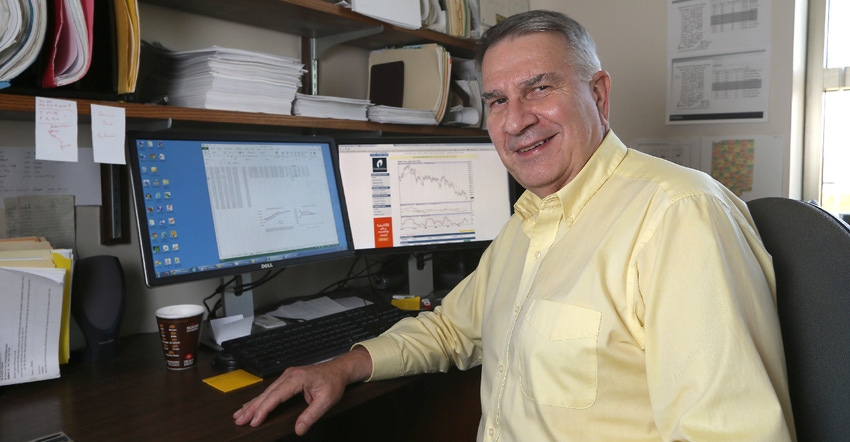December 17, 2020

Editor’s note: Indiana agriculture benefited from Chris Hurt’s wisdom for four decades. He made thorny concepts easier to understand. In 2015, Indiana Prairie Farmer and the Purdue University College of Agriculture named the Extension agricultural economist an Honorary Master Farmer.
Recently, Hurt retired. Maureen Manier in Purdue ag communication interviewed Hurt and wrote this guest editorial to recount what he did for Hoosiers.
Dear editor,
As Chris Hurt reflects on his 40-year career at Purdue, he talks about the people with whom he worked through Extension and as a professor.
“Growing up on the farm, my neighbors and our community, they were wonderful people,” Hurt begins. “I think of the people I have worked for in my job to be just like those neighbors — strong family people, hardworking and appreciative people. To think that I could bring the information to them to make better decisions, that’s been my contribution to society.”
Hurt arrived in Purdue’s Agricultural Economics Department in 1981. From the time he was a boy running a small egg business, Hurt was attracted to ag business.
“Parents encouraged children to be entrepreneurial so that they would develop that internal motivation and drive,” he explains. “They were right, because you take a lot more interest in things that are yours and that you have a connection to — you do it for the family, but you also do it for yourself. The life lessons you learn are the foundation for your future. A job isn’t done until it’s done.”
Hurt majored in ag economics at the University of Illinois. He earned a master’s degree at Cornell University and then worked for Cargill until he and his wife, Becky, returned to the family farm in Illinois to start a hog business.
Hurt doesn’t have any regrets about that decision. Although they ultimately closed the hog business, the Hurts eventually purchased all the Hurt farmland. While farming, Hurt earned a doctorate degree at the University of Illinois. After teaching at Lake Land College in Mattoon, Ill., he came to Purdue, where he felt he could have a bigger impact.
Hurt made that impact as he actively analyzed massive changes in the agricultural economy that he shared with farmers in small and large gatherings throughout the country, including testifying at congressional hearings in the U.S. Capitol. He also studied massive changes in the pork industry in the U.S., and was invited to China, Japan, South Korea and Malaysia to address the implications for the global industry.
“Cycles have always been important in agriculture,” Hurt says. “The nature of farm income has always been short periods of booming farm income and escalations of land values, followed by periods of decline where there are long periods at lower but much more stable income.”
Hurt says globalization became a primary trend in post-World War II agriculture as Russia, Japan and China entered agriculture markets. More recently, there has been a turn away from globalization to being more nationalistic. “We didn’t question globalization for 60 years. Now we need to see what happens,” he says.
Although best known for research and outreach, Hurt welcomed generations of students to his classroom. One thing remains constant, he says. “The economic principles we teach remain the same. That’s why they need to be taught.”
Now retired, Hurt looks forward to enjoying time with his wife, children and grandchildren. It was an honor to talk to Chris about his life’s work.
— Maureen Manier
You May Also Like




